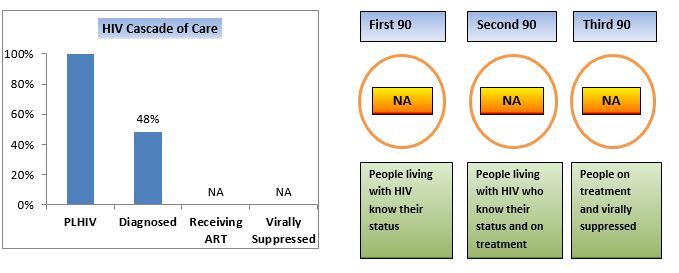Sociodemographic data
- Total population (in millions): 6.3
- Maternal mortality per 100 000 live births :9
- Life expectancy at birth (years) : 72
- Total fertility rate (births per woman) : 2.5
- GNI per capita, PPP (current international US$)
- Health expenditure, total (% of GDP) : 5.0
- Health expenditure per capita (current US$) : 372
- Human Development Index Value : 0.72

Epidemiological data (2016)
HIV estimates and case notification
|
|
Estimated |
Reported |
|
HIV prevalence in general population |
NA |
|
|
People living with HIV (PLHIV) |
NA |
|
|
New infections |
NA 309 |
|
|
AIDS-related deaths |
NA 121 |
|
|
|
|
|
HIV in specific populations
|
|
Survey data |
|
Size estimate |
Routine testing and VCT data |
|
|
Key populations |
Prevalence |
|
|
No tested |
HIV+ cases (%) |
|
Sex workers (SW) |
|
No data | |||
|
Men having sex with men (MSM) |
|
No data | |||
|
People who inject drugs (PWIDs) |
|
No data | |||
|
Prisoners |
|
No data |
|||
|
Populations in health settings |
|
|
|
No data |
|
|
TB patients |
|
|
|
No data | |
|
Pregnant women |
|
|
|
No data | |
|
Blood donors |
|
|
|
No data | |
|
Clients of testing services |
|
|
|
No data | |
Response
Policy implementation
|
|
|
|
Implementation of national policy on HIV self-testing (HIVST) |
Policy on HIVST but still not implemented |
|
Treatment initiation threshold adults and adolescents |
Treat All regardless of CD4 count |
|
Implementation of Treat All adults and adolescents |
Implemented in few (<50%) treatment sites |
|
Treatment initiation threshold children |
Treat All regardless of age |
|
Implementation of lifelong ART to pregnant & breastfeeding women |
Implemented in a small number (<50%) of MCH sites |
|
Implementation of national policy on viral load monitoring |
Fully implemented |
HIV testing coverage in key populations *
Data not available
Antiretroviral therapy and PMTCT coverage
References
(1) http://www.prb.org/pdf16/prb-wpds2016-web-2016.pdf; (2) WHO.EMRO Regional Surveillance Data; (3) UNAIDS/WHO estimates 2016; (4) Global AIDS Monitoring (GAM) 2016.





